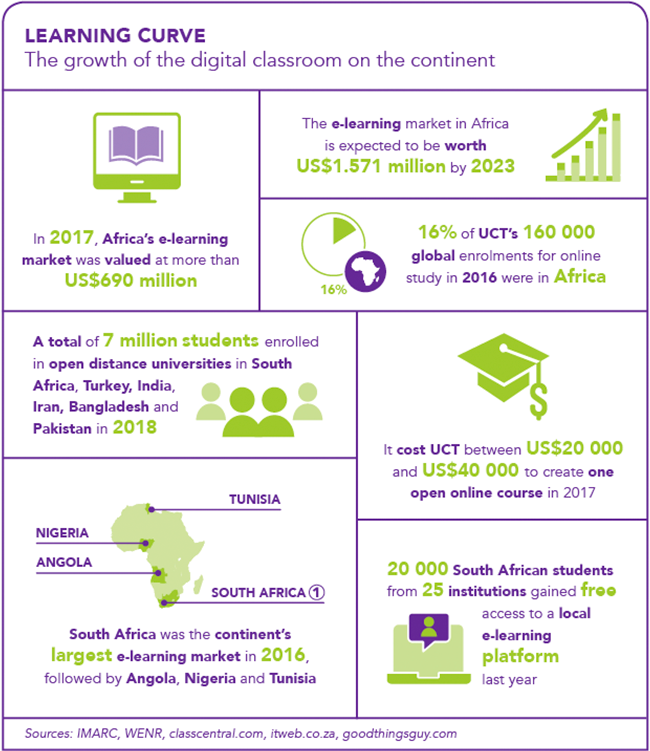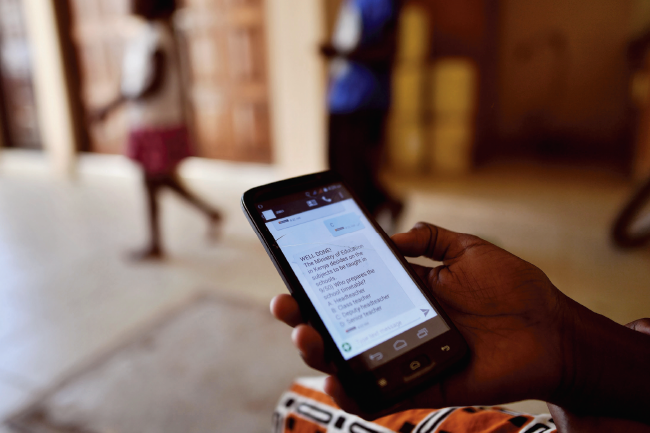The world’s top business education is being streamed into African homes and offices, shaping new leaders across the continent – from an urban setting in Nairobi and rural towns outside Johannesburg to the bustling neighbourhoods of Lagos, and beyond. As barriers of time and place are falling away, the flexible and increasingly interactive online offering now covers every aspect of business-related learning: from academic business degrees (including the international flagship MBA qualification) to short courses for working professionals, entrepreneurs and corporate leaders wanting to improve their skillset. Some of these are massive open online courses (MOOCs) – free online modules designed for mass participation – but many premium business courses are fees-based and offer interactive content with personalised online support and real-time feedback.
Over the past few decades, digital education providers have exponentially improved the access and quality of basic education for learners in Africa, and now education technology is being used to advance the business acumen of adults. The latest trends exceed the conventional scenario of students consuming online content and learning in isolation. Instead, they encourage personal online interaction, group discussions and team assignments.
The recent partnership between online education provider MasterStart and the University of Stellenbosch Business School Executive Development (USB-ED) has, for example, produced a range of fully supported online courses for professionals wanting to expand their skillsets while continuing to work.
‘We’ve launched five new courses, including operations management; HR management; business leadership and management; supply chain management; and business and systems analysis, and we are about to launch our marketing management course,’ says Andrew Johnston, CEO of MasterStart. ‘We’ve seen a 70% growth in students in 2018, with enrolments from students from nine African countries – South Africa, Namibia, Botswana, Lesotho, Ghana, Zimbabwe, Kenya, eSwatini and Nigeria – as well as other countries around the world.’
The short courses run from six to 12 weeks and fees start at ZAR10 000. ‘In the current environment of executive education, it is critical for organisations like USB-ED to stay up to date with the latest delivery methods within the digital space,’ according to Tienie Ehlers, chief learning officer at USB-ED. Underlining his vision of growing these channels, he says: ‘We will always treat our face-to-face customised executive education as priority, but will move more and more into the space of blended approaches, and this is where MasterStart gives us that critical edge.’

The digital education provider found in its 2018 South African Workforce Barometer that 76% of respondents had low confidence in their current skillsets and were highly aware of ‘the unprecedented pace of change and need for nimbleness and adaptability’. Continuous learning is the best way to reverse this trend and future-proof the continent’s workforce, according to Johnston.
To get young people in particular on board, he advocates the introduction of ‘alternative adult education programmes that are easily accessible online, in “snackable”, bite-sized pieces. The easier we can make it for people to access continuous learning materials, the better off our country will be’, he says. ‘A lot of it is up to corporates. Providing ongoing executive-level education grooms great leaders and provides turnkey or customised solutions to bridge big capability gaps to foster greater efficiency, productivity and profitability. Companies that provide opportunities for employees to learn may have a greater chance of talent attraction and retention.’
Another homegrown African company, GetSmarter, has experienced global success in this field. In 2017, the business was bought for US$103 million by 2U, a Nasdaq-listed US firm. Founded by two Cape Town brothers in 2008, GetSmarter has partnered with top-tier international universities, including Cambridge, Harvard, Oxford, Massachusetts Institute of Technology and London School of Economics.
In Africa, it has developed premium online short courses with USB-ED and the universities of the Witwatersrand and Cape Town, as well as the latter’s Graduate School of Business. GetSmarter reports a completion rate of more than 90%, with 88% of its alumni having experienced some form of career advancement after completing one of its university-backed courses. More than 50 000 students have benefited to date from the programme, whose ‘business and management’ portfolio covers subject areas such as leadership and management, operations, finance, markets, sales, commercial and contract law, IT, HR, compliance, occupational health and safety, business sustainability, and strategy.

The rapidly changing workplace, new technologies and redefining of professional roles will make continuous learning and upskilling via digital channels even more pertinent. A lack of a formal university degree will no longer necessarily be a deal-breaker for aspirant young leaders, says Advaita Naidoo, COO at Jack Hammer, the continent’s largest independent executive search firm, with offices across Africa. ‘We heard in October that Singularity University – a global community with a mission to educate, inspire and empower leaders to apply exponential technologies to help solve humanity’s grand challenges – joined hands with SingularityU South Africa, its first African country partner.’ In addition to summits and on-campus programmes, Singularity University runs 100% online courses. The self-paced, interactive Exponential Foundations Series brings together leaders from any level (including CEOs, entrepreneurs, academics and analysts) who want to explore the unknown and reframe their perspectives on global technological and economic landscapes. They learn to use new insights to create potential futures for themselves and put ideas to the test.
Africa’s leading business schools are also transforming the prestigious MBA learning experience through online platforms and digital classrooms, and some are experimenting with virtual and augmented reality. Wits Business School (WBS) has redesigned its MBA in the quest to deliver relevant and leading-edge content. ‘WBS is exploring ways to put some of our MBA syllabus into massive open online courses, for use in combination with face-to-face learning,’ says Paul Alagidede, WBS academic director. ‘The school believes that MOOCs may never entirely displace a traditional MBA, but they remain valuable tools to gain knowledge, and their use at WBS – as at other business schools – is set to grow.’

Owen Skae, director of Rhodes Business School, says that the use of technology is one way of ensuring a ‘dynamic and productive’ MBA programme. ‘The opportunities that technology brings are endless,’ he says. ‘Virtual classrooms and holograms – these are already here. Increasingly we are using online platforms to facilitate teaching and learning and certainly we see the growth of this being exponential over the next few years.’
At the tip of Africa, USB made headlines in 2016 as the continent’s first business school to offer its MBA online in real time. ‘We have a blended MBA where online synchronous class attendance is possible and it is a phenomenal success. The uptake and feedback has been brilliant,’ says Martin Butler, the school’s head of MBAs. He calls this concept a ‘glocal’ classroom, as it’s simultaneously global and local. Live video streaming and webcams enable students from across Africa and anywhere in the world to attend classes via their desktop computers, laptops or smartphones. However, for certain blocks they are required to be physically present on campus.
Not far from USB, an ambitious venture is taking shape in Durbanville, Western Cape. The private tertiary education specialist Stadio Holdings, which unbundled from Curro and listed separately on the JSE in 2017, is building a greenfield ‘multiversity’ for 5 000 contact students and 15 000 distance-learning students. The new campus is due to be running by early 2021, in addition to the already constructed facilities in Musgrave (Durban), Montana (Pretoria) and Waterfall (Midrand). Stadio combines its current brands – business education provider Milpark; teacher education provider Embury; AFDA for the creative economy; Prestige Academy for business, IT and creative; the Southern Business School (SBS); and Leaders in Fashion Education (LISOF) – under the Stadio Multiversity umbrella. This makes marketing easier and allows students to transfer between campuses and facilities without losing credits.

The group’s footprint includes operations in Windhoek and Gaborone. The long-term goal is to broaden university access by expanding its distance learning across the brands, with key qualifications accredited on both distance learning and contact learning modes of delivery. Stadio had its first doctoral degree accredited: Milpark’s doctorate in business administration. The ultimate aim is 100 000 students, 70% enrolled via distance education. ‘We are determined to engineer a mechanism for distance learning that will not only be effective, but also affordable,’ states Stadio.
The transforming landscape of online business education presents great opportunities for professionals of all ages – and Africa’s unemployed youth – to participate in the global economy and future-proof their careers.



